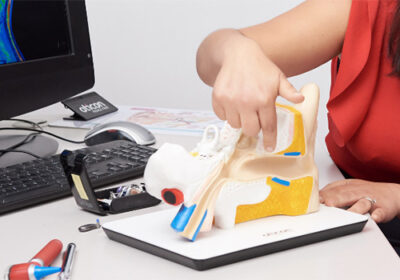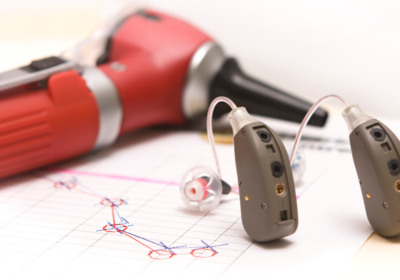Have you recently learned that you have hearing loss and may need a hearing aid? It can be a lot to take in.
While you may only buy a hearing aid once or twice in life, we’ve helped many, many people to choose a device that improves their hearing and fits with their lifestyle. Here are the answers to the most common questions we’re asked.
1. How do I know if I need a hearing aid?
You know you need a hearing aid if a hearing test performed by a qualified independent audiologist shows that you have a type or degree of hearing loss that would be improved with a hearing aid.
Many audiology clinics receive incentives from hearing aid companies. They have a vested financial interest in selling hearing aids.
Active Audiology is one of a handful of independent audiology clinics. Our advice is based purely on your clinical needs. If your hearing test results show that you would benefit from a hearing aid, we’ll provide impartial advice on the best model for your needs.
2. Are hearing aids free for pensioners?
In some cases, yes.
The government’s Hearing Services Program provides fully subsidised hearing aids to Australian pensioner concession card holders who have a hearing loss.
Check your eligibility here.
3. How do hearing aids work?
Hearing aids are highly sophisticated communication devices that use artificial intelligence to amplify sound so you can hear more clearly. The microphone receives sound and converts it to a digital signal which is boosted by the amplifier. A speaker then sends that amplified sound directly into your ear.
Hearing aids vary in size, style and price. Some sit completely in your ear canal, some sit in your outer ear and some hook behind your ear.
4. Will a hearing aid restore my hearing to normal?
No. A hearing aid doesn’t fix the root cause of your hearing loss but it improves volume and clarity.A hearing aid improves your hearing by amplifying sounds and making speech clearer. Today’s ultra-modern hearing aids are sophisticated enough to block out background noise and focus on the conversation you’re having. You will feel less tired in conversations because you no longer have to rely on lip reading and guessing what was said.
If you have the right prescription and a properly tuned hearing aid, then wearing it should enable you to hear well in most situations.
5. Can hearing aids cause vertigo?
Treating hearing loss with a hearing aid should not cause vertigo (dizziness).
However, if you do feel dizzy after starting to wear a hearing aid, then please see your audiologist. We can explore the problem, fine-tune your hearing aid if necessary and conduct further investigations to find out what’s making you dizzy.
Your inner ear is part of your body’s balance system. Vertigo can be a symptom of several conditions including:
- Meniere’s disease, where dizziness is caused by an extreme build up of fluid and pressure in the inner ear
- Benign paroxysmal positional vertigo, where you feel dizzy when you move because of dislodged calcium deposits in your inner ear
- Inner ear inflammation or infections such as vestibular neuritis or labyrinthitis.
6. How long does it take to get used to a hearing aid?
Getting used to a hearing aid takes time. It’s important to have realistic expectations and be patient as you adjust to hearing again.
Often hearing loss has happened slowly over many years. It can feel overwhelming to hear all the sounds of life again.
It’s easier to get used to a hearing aid if you:
- Have it fitted correctly (we fit your hearing aid carefully and precisely at Active Audiology)
- Wear it constantly as this helps to rewire your brain – it quickly learns to distinguish between background noise it should tune out and important sounds it should focus on
- Avoid crowded, noisy environments at the beginning to avoid feeling overwhelmed
- Keep a diary of any sounds that you struggle with so that you can discuss it with your audiologist at your follow-up appointment. When you are fitted with hearing aids with Active Audiology, we offer you an easy online method to send us your real-time feedback about the sound quality in different environments. It’s important to get those adjustments correct, especially in the early stages of wear.
7. How do hearing aids improve quality of life?
Hearing aids improve your quality of life by:
- Enabling you to enjoy close relationships with easy communication
- Enabling you to engage in an active social life
- Helping you participate fully in work meetings and conferences
- Improving your self-image and self-esteem.
Untreated hearing loss is one of the biggest risk factors for dementia since it speeds up the rate of brain atrophy (loss of brain cells). Depending on the degree of hearing loss, you could be up to 5 times more likely to develop dementia.
We now know that wearing hearing aids will help to make sure your hearing nerves and brain receive the stimulation they need to function well. Keep your brain and ears healthy by continually using your hearing pathways – it’s no different to keeping your bodies healthy by exercising your muscles!
8. How long will my hearing aid last?
A hearing aid may last 5-10 years, depending on how you wear them and if your hearing requires different technology over time.
Hearing aid technology is advancing rapidly, much like smartphones. Most patients decide to upgrade every 5 years or so to benefit from better technology.
9. How long do hearing aid batteries last?
A hearing aid battery may last from a few days to a few weeks. Follow these tips to improve the life of your hearing aid batteries.
Battery life will depend heavily on whether you are linking other bluetooth devices to your hearing aid such as your mobile phone or TV.
At Active Audiology we also offer rechargeable hearing technology. You can recharge your devices just like you recharge your phone. This means there are no ongoing costs for disposable batteries and you won’t get caught with no batteries at an important event.
10. What can I do when hearing aids no longer help?
Like any other medical condition, your hearing needs can change over time. If you feel that your hearing has changed, the best thing to do is to make an appointment with your audiologist to assess your hearing and retune your hearing aids. Your audiologist will discuss any other options with you, such as different devices or further medical referrals.
How can Active Audiology help?
Active Audiology is an independent clinic dedicated to giving you accurate testing, diagnosis and hearing solutions for your hearing loss.
As an independent audiology clinic, we do not work on incentives set by hearing aid manufacturers. Instead, we provide impartial advice to you about whether a hearing aid would help you live the life you want and, if so, which device would suit you best.
Please make an appointment today.
Disclaimer
All information is general in nature.




